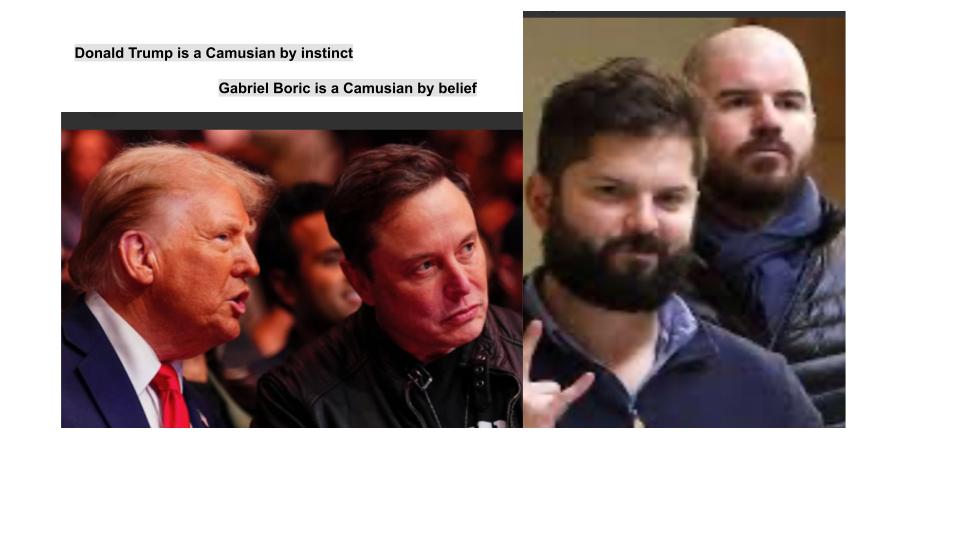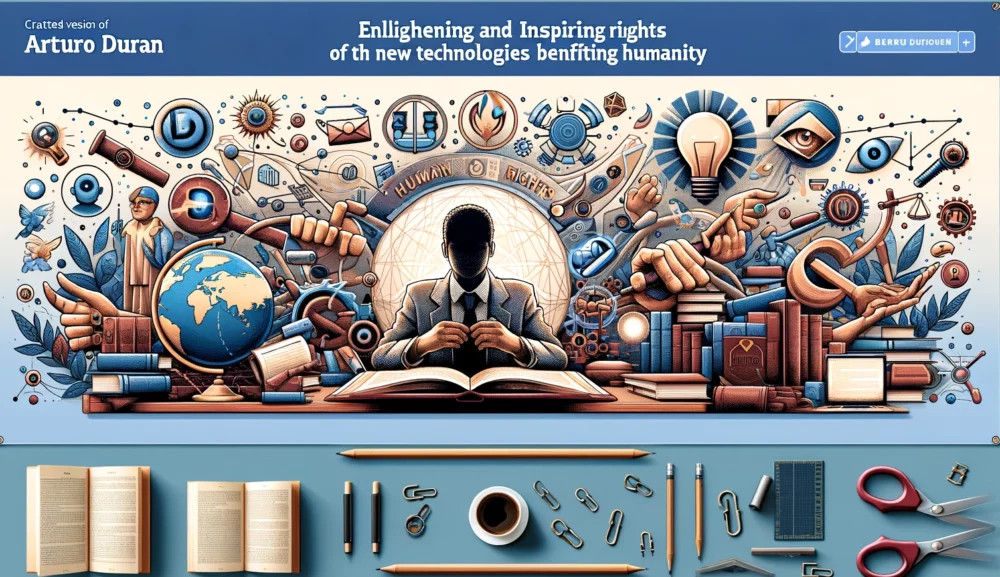
Donald Trump is a Camusian by instinct Gabriel Boric is a Camusian by belief
If I were the President of a country and admired Albert Camus, it would likely be because of his commitment to moral integrity, individual freedom, and resistance against injustice. Camus’ philosophy of the Absurd—the idea that humans seek meaning in a world that provides none—might seem nihilistic, but his ultimate conclusion was one of defiant hope: that despite the absurdity of life, we must still act with courage, compassion, and honesty. As a leader, this would mean:
Why Admire Camus?
- Commitment to Truth: Camus despised propaganda and refused to be a mouthpiece for ideologies, even when it cost him friendships. A President who admires him would prioritize truth over political convenience.
- Resistance to Oppression: Camus was a vocal critic of both fascism and totalitarian communism. A Camus-admiring President would likely reject extremism and authoritarianism in favor of human dignity.
- Pragmatic Morality: He wasn’t an idealist but believed in ethical action in a flawed world. His stance on the Algerian War—both condemning French colonialism and opposing nationalist terrorism—showed his refusal to take easy sides.
- Empathy and Humanism: His works, like The Plague, emphasize human solidarity in the face of crisis—an essential quality for a leader managing a country through pandemics, war, or social upheaval.
- A Rebel’s Spirit: Camus’ notion of the “rebel”—one who resists injustice but does not become an oppressor—could inspire policies that are bold but not tyrannical.
What’s the Downside?
- Political Isolation: Camus refused to blindly follow ideological groups, which led to alienation from both left-wing and right-wing intellectuals. A leader like him might struggle to build strong alliances in the messy world of politics.
- Pragmatism vs. Idealism Conflict: Camus’ rejection of utilitarianism (sacrificing some for the “greater good”) might make certain hard political decisions—like war, economic trade-offs, or security measures—more difficult.
- The Absurd President? A leader embracing the absurd might be perceived as too philosophical and detached from practical governance. Voters and political rivals might not appreciate a leader who openly admits that life lacks inherent meaning.
- Rejection of Grand Ideologies: Most political movements rely on grand narratives (progress, revolution, nationalism). Camus’ skepticism toward ideology could make it hard to rally people behind a unifying vision.
- Public Perception & Criticism: Being too honest about the lack of absolute justice or meaning could alienate religious and ideological groups. Imagine a President saying, “Life is absurd, but let’s be decent anyway.” Not exactly a rousing campaign slogan.
Would It Be Crazy?
Admiring Camus as a President wouldn’t be crazy—it would be deeply principled. The real challenge would be whether a Camus-inspired leader could navigate the compromises of power without losing their moral core. Camus’ rebel spirit might make for an inspiring leader, but governing requires alliances, tough choices, and sometimes, a willingness to get your hands dirty—something he would have probably hated.
Would you vote for a Camus-style President?

Boric & Trump: Camus in the Mirror?
At first glance, Gabriel Boric and Donald Trump seem like political opposites. Boric, a leftist leader from Chile who proudly cites Albert Camus as a guiding influence, rose to power with the backing of Chile’s Communist Party. Trump, a self-styled right-wing populist, champions economic nationalism, rejects traditional elites, and publicly embraces a “strongman” persona.
But here’s where things get strange: both of them, in their own way, embody aspects of Camus’ philosophy. Boric consciously follows Camus, while Trump, perhaps unintentionally, often acts in ways that align with Camus’ vision of rebellion and absurdity.
1. The Paradox of Their Elections
- Chile, historically the most economically right-wing country in Latin America, elects Boric, a former student protest leader supported by the Communist Party. The contradiction? A neoliberal stronghold chooses a self-proclaimed leftist.
- The U.S., a symbol of democracy and establishment politics, elects Trump, a reality TV star and real estate mogul, who destroys traditional Republican orthodoxy and defies political norms.
Both of these elections scream revolt against the system, something very Camusian—but from different angles.
2. The Camus Connection
Camus championed the absurd rebel—someone who refuses to accept unjust systems but doesn’t become a dictator themselves. How does that apply here?
Boric: The Consciously Ethical Rebel
- Boric sees himself as a moral revolutionary, fighting against inequality but still respecting democratic institutions.
- He believes in solidarity, a key theme in The Plague—one that emphasizes human cooperation even in the face of existential absurdity.
- His struggle? The Communist Party’s influence—can he remain a Camusian rebel while aligning with an ideological machine that demands conformity?
Trump: The Unconscious Rebel
- Trump, like Camus’ absurd hero Meursault in The Stranger, rejects societal norms without remorse. He refuses to play the game, whether it’s political correctness, traditional diplomacy, or even basic decorum.
- He thrives in chaos and defiance, making his leadership existential rather than ideological. He doesn’t believe in grand narratives—he simply acts.
- His struggle? Power for power’s sake. Unlike Boric, he doesn’t seem concerned with the ethical implications of rebellion—his rebellion is personal, not philosophical.
3. Boric and Trump: More Alike Than Their Followers Admit
- Both despise political elites and claim to represent “real people” against an entrenched system.
- Both are outsiders who unexpectedly won elections, defeating establishment figures.
- Both have authoritarian temptations: Boric, via his alliance with communists, and Trump, via his disregard for institutional limits.
- Both struggle with governing after rebellion—Boric faces an economic crisis and institutional gridlock; Trump, during his presidency, often clashed with the system he vowed to dismantle.
4. What Does This Say About Politics Today?
- Chile, a right-wing economy, votes left. The U.S., a liberal democracy, votes for an anti-establishment strongman.
- Ideology matters less than existential revolt. People don’t just vote for policies anymore—they vote for rebellion against the status quo.
- Camus’ idea of the rebel who resists without becoming an oppressor is hard to sustain in real-world politics. Boric tries to walk that fine line. Trump doesn’t seem to care.
5. The Downside of This Comparison
If Camus were alive, he’d likely reject both of them—Boric for allying with ideologues, and Trump for rejecting moral responsibility. But the fact that two seemingly opposite leaders reflect the same existential tensions tells us something:
Modern politics is less about left vs. right and more about rebellion vs. the establishment.
Trump is a Camusian by instinct. Boric is a Camusian by belief.
Both are products of a world where the old political frameworks are crumbling
Would Camus approve? Probably not. But he’d definitely write a hell of an essay about it.
